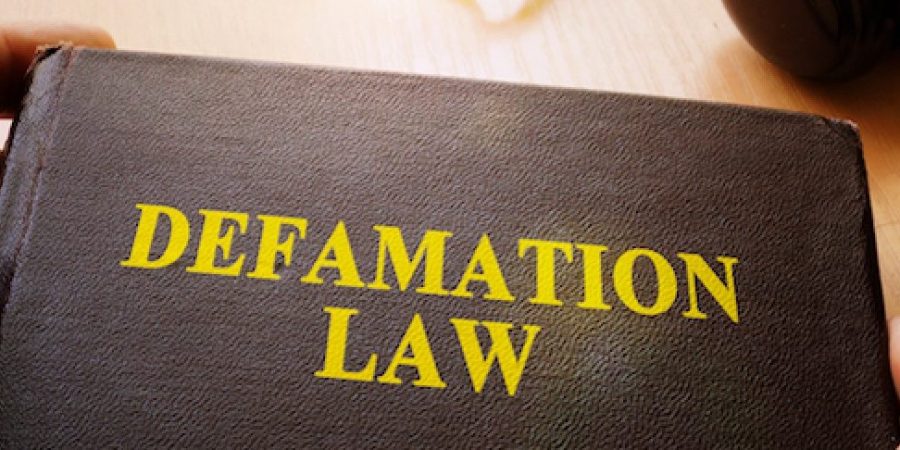No business owner likes having the quality of their business questioned. However, there’s a difference between fair reviews and comments on a business, and attacks designed to harm the reputation of a company. If someone is spreading bad news about your products/services, talks bad about your company, or leaves scathing online reviews, you can sue them.
In Singapore, defamation against a business can be held to either be a criminal offence (Section 499 of the Penal Code), and/or a civil tort (Chapter 75 of the Defamation Act). There are 2 types of defamation: i) Libel, and ii) Slander.
| Libel | Slander | |
| Communication method | Permanent – written or broadcast | Temporal – spoken |
| Examples of communication mediums | Newspapers, articles, blog posts, social media posts, videos, radio broadcasts, TV shows | In-person communication, speeches, talks, comments at meetings |
To sue someone for defaming your business, the statements in question must meet the 3 elements of defamation in Singapore.
Element #1. The statement must be defamatory in nature.
For a statement to be considered defamatory, the statement must meet 1 or more of the following criteria:
- Lower the victim in the estimation of right-thinking members of society, or
- Cause the victim to be shunned or avoided, or
- Expose the victim to hatred, contempt or ridicule
For instance, a viciously opinionated online review would very likely fulfill the above standards. Such a review would cause your business to be held in lower regard (Criteria 1), and probably cause you to lose potential customers (Criteria 2). It might even invite people to make internet memes out of you, or mock your business on social media (Criteria 3).
Element #2. The statement must identify your business explicitly or implicitly
Explicit identification is simple: the defamer must identify your business or you directly. A review left on your Google page, a social media post titled “ABC Company Is Trash”, or videos that mention your business by name are all examples of direct identification.
However, identification can also be implicit. You can still sue someone even if they did not name your business directly, but made remarks or references that could be reasonably inferenced to identify your business. Examples of implicit identification include:
- Making remarks about some aspect of your business that can be reasonably used to identify your company
- Making remarks about a unique service or product that only you offer
- Posting pictures of your products that can be reasonably linked to your business
Element #3. The statement must be communicated to a 3rd party
The defamatory statements must have been made known to someone other than yourself. For online reviews, or online comments, this standard is easy to meet, since the statements would have been published online and exposed to the public.
For verbal statements without written proof, or video/audio evidence, you can call upon witnesses to support your defamation claim.
Can I sue someone for writing a bad review about my business?
Yes, you can. The review must meet the 3 defamation elements as outlined above.
Can I sue someone for talking bad about my business?
Yes, you can. The review must meet the 3 defamation elements as outlined above. If the person is spreading rumours or criticism about your business without the use of published mediums that you can cite as evidence (e.g. he’s saying these remarks in-person to other people), you’ll have to call on witnesses to prove your case.
Defences against defamation
Defence #1. Justification
The defendant can win against your lawsuit by proving that the defamatory statement is true in substance and fact. For instance, say a client publishes this Facebook post about your business:
“ABC Company’s interior design services were so poor. The designs they gave us were so different from our requests, and they didn’t bother to include many details. They were also frequently late in submitting designs. Would not recommend at all.”
If you sued them, the client would have to prove the designs they received from you deviated significantly from their requests. They would also have to prove you didn’t meet submission deadlines. For instance, if they requested a French-style interior décor and you instead submitted a Japanese-style design, and you repeatedly sent designs days after you were supposed to, then they would prevail against your defamation suit.
Defence #2. Fair comment
The defendant can prevail against your defamation lawsuit by proving all of the following:
- The statements in question were comments, not statements of fact.
- The comments were based on facts.
- The comment is fair, meaning it is something a fair-minded person would say or write. Some leeway is allowed for personal bias or exaggerations.
- The comment is in the public interest, meaning it is something the public may be interested in knowing or have concern for.
In the case of a bad review, if the person you’re suing left a review that was composed entirely of opinions, then you are unlikely to win your defamation lawsuit against them. Take the following review for instance:
“The food tasted absolutely disgusting. The fish was so salty, the vegetables tasted bitter, and the meat was overcooked to death. I hope this place shuts down. Please do not EVER come here!!!”
Now, that’s a really nasty review. I’m sure if your business received a review like that, you’d be hopping mad. But are the contents of this review grounds to sue for defamation? The answer in this case, unfortunately, is likely to be no. The review doesn’t contain any statements of fact – in fact it’s composed entirely of opinions. That the food was “disgusting”, “so salty”, “bitter”, or “overcooked” are all matters of personal judgement, however strongly worded they might be (Criteria 1). These opinions were based on the fact that the reviewer dined at your restaurant, and did not personally enjoy the preparation of the food (Criteria 2). The statement can be adjudged to be reasonably fair (it did not contain a vicious litany of vulgar comments, for instance – Criteria 3). Also, it could be said that the statement merited public interest, since reviews help people to decide if a restaurant is worth visiting or not (Criteria 4). Because of these 4 defence elements, you likely won’t be able to successfully sue this angry reviewer.
Here’s another version of the above review, worded differently:
“The food tasted absolutely disgusting. Everything was terrible, and the restaurant was really filthy. I found dead insects in my soup. I even saw two rats running around on the floor! Please do not EVER come here unless you want to fall SICK!!!”
If you received a review like this, it would likely be grounds for you to sue for defamation. This review makes multiple allegations of fact. The poster claims the presence of harmful pests, insinuating there are serious hygiene lapses which could introduce diseases to patrons. Remember that when you sue for defamation, you don’t have to prove that the defamatory statement is false. Instead, the defendant must prove that their statement is true in substance and fact. In this case, the burden is on the defendant to prove that they in fact “found dead insects” floating in their soup dish, and in fact witnessed “two rats” scurrying around in your restaurant. If they can’t prove this to be true, then you’ll likely succeed in your lawsuit against them (hooray!).
In fact, you can not only sue for defamation in the above example – you could also sue the reviewer for spreading malicious falsehoods. If you can prove that the reviewer acted knowing that what they said was false, or they had intent to harm your business, you can seek further damages for the additional tort of perpetuating malicious falsehoods.
What compensation can you claim for defamation?
If you succeed in your defamation lawsuit, you can seek monetary damages. These damages are designed to compensate you for damage to reputation, damage to your business income, and to vindicate your name in public.
The amount of damages awarded will be based on:
- The severity of the defamatory statement
- How widely circulated was the defamatory statement
- Any mitigating actions taken by the defendant (e.g. retracting the statement, issuing a public apology, etc.)
Sometimes, “aggravated damages” may be awarded in addition to regular damages (called “general damages”). Aggravated damages are compensation for the defendant’s behaviour or intent that cause additional harm to the plaintiff. For instance, if the defendant continues publishing more defamatory statements about you, even after being informed of the lawsuit/the untruthfulness of their statements, and they published especially malicious claims, that may be grounds for aggravated damages. Take note that Singapore’s High Court has ruled that aggravated damages can only be awarded for defamation against persons, but not corporate entities.
Suing for libel vs slander
If you sue for slander, you ordinarily have to prove that you suffered “special damages” – this is basically proving that you suffered quantifiable financial losses as a direct result of being slandered. Without proof of special damages, you won’t be able to sue. However, some exceptions to this rule exist: slander that affects official, professional, or business reputation does not require this proof. So, if someone slanders you as a company director, or your business, you don’t need to prove special damages.
If you sue for libel, you don’t have to prove special damages. The law automatically assumes you suffered special damages.
Just because you can, doesn’t mean you should
Launching a defamation suit against a hostile reviewer is much easier in Singapore than say, the US. The defence of fair comment is defined more narrowly here, unlike in America where the 1st Amendment covers all public opinions.
However, just because you can sue, doesn’t mean you should sue. From an operational perspective, launching a lawsuit against a single bad review is probably not the smartest thing to do. Why? Lawsuits are incredibly costly, and drain a lot of your time and energy. You could have spent the money on growing your business, and getting new customers who will actually leave your business positive reviews. Also, in this age of social media, the customer you’re suing could well expose your lawsuit against them online. The optics of a company suing an individual – potentially for something that others might deem trivial – are probably not going to reflect well on your business. By suing them, you might actually be shooting yourself in the foot by generating more bad press for yourself.
Case in point: Dessert store owner threatens lawsuit over review
In 2018, a dessert shop in Singapore called Fantasy Desserts caused a big online commotion. The shop owner had publicly threatened to sue someone who had left a poor review of their food. The store owner engaged the reviewer with many combative remarks, and threatened to sue for defamation unless the reviewer deleted her unflattering opinion. Netizens swarmed to criticise the store owner, and the case even got picked up by news outlets like Asiaone and Mothership. The store closed in 2019. Whether or not the closure was due to the online furore is unclear, but it wouldn’t be difficult to draw a connection between its angry public threats, the permanent damage to its own reputation, and lost business. The amount of viral attention the store received (and not the good kind) is a clear lesson that good customer management, and not legal threats, should be your first response when handling public criticism.
Here’s a useful action plan for handling poor reviews or criticism of your business:
- Respond politely, or just let the review/comments slide. There will always be that one unhappy customer out of all the clients you serve.
- If the client continues to spread bad news about your business, or seems particularly upset, initiate a conversation directly with them. Why are they unhappy? Did they feel you didn’t deliver what you promised, causing them disappointment, disruption to their own affairs, or even financial losses? Try to work out a solution – maybe you could offer them a refund, a replacement, or try to rectify a mistake if you did make one.
- If step 2 doesn’t work, and the client continues attacking your business, analyse how your business is being affected. If sales are noticeably being affected, then you should consider initiating legal action.
Ready to protect your business?
Online attacks against your company aren’t the only thing you should worry about. Employee injuries, business-related lawsuits, even getting sued for defamation yourself – these are all very real threats that your business will face everyday. Since we’re on the topic of defamation lawsuits, ask yourself this: what happens if a competitor accused you of defaming their business? Whether your competitors’ allegations are true or not doesn’t really matter, because you’d still have to hire a lawyer to defend yourself. And when it comes to hiring lawyers, let’s be real – it’s going to cost you a lot of money. Did you know that there’s a liability insurance policy that can protect you from such large legal costs? Enter Professional Indemnity Insurance.
Professional Indemnity Insurance covers the costs of defamation lawsuits. It pays for lawyer’s fees and the cost of damages/settlements. This ensures you’re not left with a large hole in your pocket. It also covers a wide range of other business-related lawsuits, like negligence lawsuits (e.g. you make accidental mistakes in your work, and a client sues you. That’s covered too.).
The cost of dealing with a massive lawsuit could bankrupt a small business. Don’t take any chances with your livelihood – make sure you protect your business with the best insurance policies possible.
Provide’s online platform helps business owners like you get quick & easy business insurance. Coverage is comprehensive, while premiums are affordable. Get these essential business covers now:
| Coverage | Premium | Online Purchase Available |
| Professional Indemnity Insurance | From $42/month | Click to buy online |
| Commercial Property Insurance | From $12/month | Click to buy online |
| Public Liability Insurance | From $9/month | Click to buy online |
| Work Injury Compensation Insurance (WICA Insurance) | From $5/month per worker | Click to buy online |



